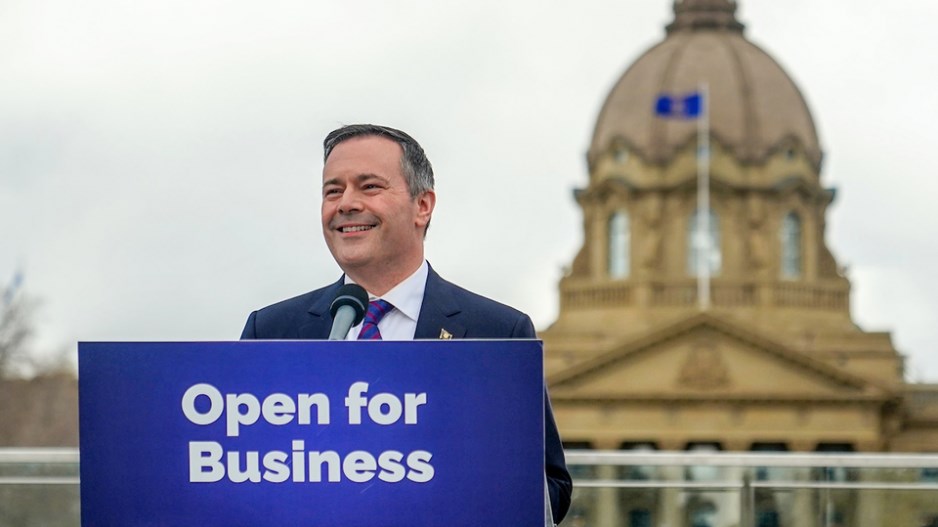It’s officially called the Preserving Canada’s Economic Prosperity Act, but even Alberta’s new premier, Jason Kenney, has referred to it as the Turn-off-the-Taps Act, and on Wednesday (May 1) he sketched out his plans for using it – or not using it.
The act, Bill 12, was proclaimed by the new Kenney government Tuesday. It will use licensing to give the Alberta the government control over the exports of oil and refined fuel products like gasoline and diesel.
Its primary intention is to pressure B.C.'s John Horgan government ito back off of its “obstruction” of the $7.4 billion Trans Mountain pipeline expansion.
“By proclaiming this law, we’re showing that we’re serious about protecting Canada’s vital economic interests,” Kenney told reporters. “This does not mean energy shipments will immediately be reduced, but rather that our government will now have the ability to actually use the law, should circumstances require."
Kenney said he would try diplomacy first with Horgan, followed by more conventional trade warfare tactics before exercising his nuclear option.
“We will look at other ways of responding before we get this strongest tool in our tool box, which is Bill 12. So we do not intend to use this right now. We are simply communicating our willingness to do so, should we face a long-term campaign of obstruction.”
But in proclaiming Bill 12 without immediately implementing it, Kenney has give the B.C. government the opportunity to try to thwart it.
B.C. has already applied to the courts to have Bill 12 proclaimed unconstitutional. That application was rejected as premature because the bill had not been officially proclaimed.
This morning, May 1, Premier John Horgan says government lawyers have already filed two court applications aimed at striking down Bill 12.
Kenney pointed out that a previous energy battle, fought by former premier Peter Lougheed, resulted in a constitutional amendment that gave provinces more control over their resources. He therefore thinks Bill 12 will withstand a constitutional challenge.
B.C. is now suffering from the highest gasoline prices in North America, and part of the problem, Kenney said, is a lack of pipeline capacity that would allow more refined fuels to flow to B.C. He also pointed to recent polling that suggests the majority of British Columbians want to see the Trans Mountain pipeline expanded.
The Horgan government has threatened to introduce restrictions on the flow of diluted bitumen from Alberta through B.C. by either pipeline or rail. Alberta's response is to oblige the Horgan government by cutting B.C. off of oil and refined fuels.
Provided it withstands a constitutional challenge, Bill 12 gives the Alberta government the power to control exports.
One tactic that has been floated is that the Alberta government could increase the volume of bitumen that flows on the existing Trans Mountain pipeline, which could push refined fuels like gasoline or diesel off the pipeline and onto truck or train, increasing the cost.
As Kenney pointed out, most of B.C.’s gasoline and diesel comes from Alberta, either as refined products or as oil that is then refined at the Parkland refinery in Burnaby. He suggested the Horgan government's pipeline obstructionism is partly to blame for the gasoline “crisis” now hitting British Columbians.
“The B.C. government has opposed the expansion of this pipeline every step of the way, most recently at the British Columbia Court of Appeal,” he said. “And in so doing, they’ve driven up gasoline prices in the Lower Mainland.
“The B.C. government is doing everything it can to block the very pipeline that would get Alberta oil and gas to the gasoline constrained Lower Mainland and beyond.”
Kenney offered Horgan a way out of what could be a very painful gasoline crisis.
“I acknowledge Premier Horgan is dealing with a very serious problem with the escalation of retail gas prices, particularly in the Lower Mainland,” Kenney said.
“People in the Vancouver region are rightfully ticked off. They’re paying a buck seventy a litre to fill up their cars and their trucks and they want to know why. And I believe one of the reasons why is that we don’t have enough pipeline capacity to ship both refined gas and unrefined bitumen to the Lower Mailand.”
Kenney said the Trans Mountain expansion “will mean that we can increase shipments of refined products to the Lower Mainland. That will reduce gas prices for Vancouverites.”
But just because the pipeline’s expansion can increase the volume of refined fuel products into B.C., that doesn’t mean it will.
As Trans Mountain has pointed out, it does not control what moves on the existing pipeline. What moves on the pipeline is entirely up to shippers that have pipeline allocations.
There have been zero commitment from shippers, refiners, the federal government or anyone else that the pipeline’s expansion will actually result in more refined fuels from Alberta and lower gasoline prices.
Kenney said he spoke to Horgan Tuesday night and said he hopes to meet with him in person soon “to discuss these matters at length.” He hopes to hold the meeting before a Western Premiers conference in June.




